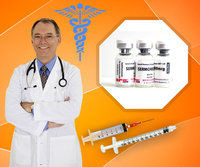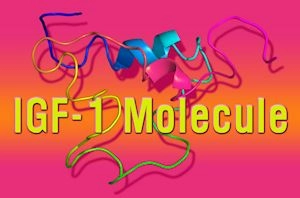Introduction
The bladder's extracellular matrix (ECM) plays a pivotal role in maintaining its structural integrity and function. Among the key components of the ECM are glycosaminoglycans (GAGs) and proteoglycans, which contribute significantly to the bladder's resilience and its ability to store urine. Recent studies have begun to explore how hormonal fluctuations, particularly those of testosterone, may influence the composition of these ECM elements. This article delves into the effects of testosterone status on the GAG and proteoglycan composition of the bladder ECM, with a specific focus on implications for men's urological health.
The Role of Glycosaminoglycans and Proteoglycans in the Bladder
Glycosaminoglycans, such as chondroitin sulfate and hyaluronic acid, and proteoglycans, like decorin and biglycan, are integral to the bladder's ECM. They provide a hydrated, gel-like environment that cushions the bladder wall and facilitates its distensibility. The balance and integrity of these components are crucial for preventing conditions such as interstitial cystitis and bladder cancer, which can significantly impact quality of life.
Testosterone's Impact on Bladder ECM Composition
Testosterone, the primary male sex hormone, has been shown to influence various aspects of male physiology, including muscle mass, bone density, and even mood. Emerging research suggests that testosterone may also affect the composition of the bladder's ECM. Studies have indicated that testosterone can modulate the synthesis and degradation of GAGs and proteoglycans, potentially altering the bladder's structural and functional properties.
In men with normal testosterone levels, the bladder ECM typically exhibits a balanced composition of GAGs and proteoglycans, supporting optimal bladder function. However, in conditions of testosterone deficiency, such as hypogonadism, there may be a shift in the ECM's composition. For instance, reduced testosterone levels have been associated with decreased GAG content, which could compromise the bladder's protective barrier and increase susceptibility to urological disorders.
Clinical Implications for Men's Urology
Understanding the relationship between testosterone status and bladder ECM composition has significant implications for men's urological health. For men experiencing symptoms of lower urinary tract dysfunction, assessing testosterone levels may provide insights into potential underlying causes related to ECM alterations. Moreover, testosterone replacement therapy (TRT) in hypogonadal men could potentially restore the balance of GAGs and proteoglycans, thereby improving bladder function and reducing the risk of urological conditions.
Future Research Directions
While the link between testosterone and bladder ECM composition is promising, further research is needed to fully elucidate the mechanisms involved and to establish clinical guidelines. Longitudinal studies examining the effects of testosterone supplementation on bladder health in men with hypogonadism could provide valuable data. Additionally, exploring the role of other hormones and factors that may interact with testosterone in modulating ECM composition could offer a more comprehensive understanding of bladder health.
Conclusion
The composition of glycosaminoglycans and proteoglycans in the bladder's extracellular matrix is crucial for maintaining its function and integrity. Testosterone status appears to play a significant role in modulating these ECM components, with potential implications for men's urological health. As research in this field progresses, it may pave the way for novel therapeutic approaches that target the hormonal regulation of bladder ECM to improve outcomes for men with urological disorders.
Contact Us For A Fast And Professional Response

- Androgen-Dependent Regulation of PDE5 in Prostatic Tissue: Implications for Male Urological Health [Last Updated On: February 17th, 2025] [Originally Added On: February 17th, 2025]
- Unveiling the Role of Prostatic Acid Phosphatase in Monitoring Androgen Activity During Testosterone Replacement Therapy in Men [Last Updated On: March 3rd, 2025] [Originally Added On: March 3rd, 2025]
- Testosterone's Impact on Bladder Health: Insights from Ultrastructural Studies and Therapeutic Implications [Last Updated On: March 7th, 2025] [Originally Added On: March 7th, 2025]
- Understanding Urethral Health Challenges in Androgen-Deficient Men: Histopathological Insights and Treatment Options [Last Updated On: March 8th, 2025] [Originally Added On: March 8th, 2025]
- Testosterone's Influence on Prostate Stroma: Implications for Therapeutic Strategies and Disease Management [Last Updated On: March 9th, 2025] [Originally Added On: March 9th, 2025]
- Exploring the Impact of Hormone Replacement on Pelvic Floor Electromyographic Activity in Hypogonadal Men [Last Updated On: March 12th, 2025] [Originally Added On: March 12th, 2025]
- Prostatic Alpha1-Adrenoreceptor Density, Testosterone, and LUTS Severity in American Men [Last Updated On: March 13th, 2025] [Originally Added On: March 13th, 2025]
- Exploring the Impact of Testosterone Replacement Therapy on Post-Void Residual Volume in Men: A Longitudinal Study [Last Updated On: March 13th, 2025] [Originally Added On: March 13th, 2025]
- Unlocking the Secrets of Lower Urinary Tract Dysfunction in Men: The Role of Urinary Proteomics in Androgen Deficiency [Last Updated On: March 15th, 2025] [Originally Added On: March 15th, 2025]
- Prostatic Aromatase, Estradiol, and BPH Risks in Aging Men on Testosterone Therapy [Last Updated On: March 17th, 2025] [Originally Added On: March 17th, 2025]
- Metabolomic Insights into Testosterone Deficiency: Prostatic Fluid Analysis and Treatment Implications [Last Updated On: March 17th, 2025] [Originally Added On: March 17th, 2025]
- Neural Density in Detrusor Muscle of Hypogonadal Men: Clinical Implications and Therapies [Last Updated On: March 18th, 2025] [Originally Added On: March 18th, 2025]
- Urinary Flow Cytometry: Revolutionizing Hypogonadism Care in American Men [Last Updated On: March 18th, 2025] [Originally Added On: March 18th, 2025]
- Testosterone Therapy's Impact on Prostatic Inflammation in Hypogonadal American Males [Last Updated On: March 19th, 2025] [Originally Added On: March 19th, 2025]
- Androgen-Regulated Gene Expression in Urothelium of American Males Post-HRT: Transcriptomic Insights [Last Updated On: March 19th, 2025] [Originally Added On: March 19th, 2025]
- Testosterone Deficiency Impacts Bladder Muscle Mitochondria: Urological Health Insights [Last Updated On: March 19th, 2025] [Originally Added On: March 19th, 2025]
- Ultrasonographic BWT Assessment in Men with LOH: Urodynamic Correlations and Clinical Insights [Last Updated On: March 19th, 2025] [Originally Added On: March 19th, 2025]
- Testosterone Deficiency and Kidney Stones: Urine Sediment Patterns and Clinical Insights [Last Updated On: March 20th, 2025] [Originally Added On: March 20th, 2025]
- VUR in Hypogonadal Men: Bladder Neck Dysfunction and Hormonal Influences in American Males [Last Updated On: March 21st, 2025] [Originally Added On: March 21st, 2025]
- TRT's Impact on Prostatic Blood Flow: Insights from Color Doppler Ultrasonography [Last Updated On: March 22nd, 2025] [Originally Added On: March 22nd, 2025]
- Urinary Exosomal miRNAs: Biomarkers for Managing LUTS in Hypogonadal Men [Last Updated On: March 22nd, 2025] [Originally Added On: March 22nd, 2025]
- Testosterone Therapy's Impact on Prostatic Hyperplasia in Hypogonadal Men: A Morphometric Study [Last Updated On: March 22nd, 2025] [Originally Added On: March 22nd, 2025]
- TRT's Impact on Prostate Health: Assessing Stiffness with Transrectal SWE in American Men [Last Updated On: March 22nd, 2025] [Originally Added On: March 22nd, 2025]
- Urodynamic Insights and HRT Benefits for Detrusor Overactivity in Testosterone-Deficient Men [Last Updated On: March 22nd, 2025] [Originally Added On: March 22nd, 2025]
- PNEC Density in Androgen-Deficient Men: Impact and Reversal with HRT [Last Updated On: March 23rd, 2025] [Originally Added On: March 23rd, 2025]
- TRT's Impact on Prostatic Smooth Muscle: Electron Microscopy Insights for American Men [Last Updated On: March 23rd, 2025] [Originally Added On: March 23rd, 2025]
- Testosterone Therapy's Impact on PSA Kinetics: Monitoring Protocols and Safety [Last Updated On: March 23rd, 2025] [Originally Added On: March 23rd, 2025]
- Testosterone Therapy Enhances Bladder Sensory Afferents in Deficient Men: A Neurophysiological Study [Last Updated On: March 24th, 2025] [Originally Added On: March 24th, 2025]
- UPP Changes in Hypogonadal Men Before and After Androgen Replacement Therapy [Last Updated On: March 24th, 2025] [Originally Added On: March 24th, 2025]
- DSD in Androgen-Deficient Men: Prevalence, Urodynamics, and Hormonal Links [Last Updated On: March 24th, 2025] [Originally Added On: March 24th, 2025]
- Non-Bacterial Prostatitis and Hypogonadism: Insights and Testosterone Therapy Benefits [Last Updated On: March 24th, 2025] [Originally Added On: March 24th, 2025]
- TRT Improves Micturition Patterns in American Men with Hypogonadism: A Diary Study [Last Updated On: March 24th, 2025] [Originally Added On: March 24th, 2025]
- Testosterone's Impact on Prostate Gap Junction Proteins and Urological Health [Last Updated On: March 25th, 2025] [Originally Added On: March 25th, 2025]
- Testosterone Deficiency and Nocturnal Polyuria: Pathophysiology and HRT Benefits in Men [Last Updated On: March 25th, 2025] [Originally Added On: March 25th, 2025]
- Testosterone Deficiency Impacts Autonomic Innervation and Urological Health in American Men [Last Updated On: March 25th, 2025] [Originally Added On: March 25th, 2025]
- Androgen Deficiency Impacts Bladder Protein Expression: Proteomic Insights and Therapeutic Potential [Last Updated On: March 25th, 2025] [Originally Added On: March 25th, 2025]
- Testosterone Deficiency and Bladder Function: Insights from Ambulatory Urodynamic Monitoring [Last Updated On: March 25th, 2025] [Originally Added On: March 25th, 2025]
- Testosterone Therapy's Impact on Prostatic Hyperplasia in American Men: Growth Factor Insights [Last Updated On: March 25th, 2025] [Originally Added On: March 25th, 2025]
- Prostatic Calcifications in Hypogonadal Men: Prevalence, Composition, and LUTS Association [Last Updated On: March 25th, 2025] [Originally Added On: March 25th, 2025]
- Testosterone Therapy's Impact on Prostate Health: A Histomorphometric Analysis [Last Updated On: March 25th, 2025] [Originally Added On: March 25th, 2025]
- TRT's Impact on Uroflowmetric Parameters and Hormone Levels in American Men [Last Updated On: March 25th, 2025] [Originally Added On: March 25th, 2025]
- Androgen Receptor Distribution in Hypogonadal Men's Lower Urinary Tract: Urological Insights [Last Updated On: March 25th, 2025] [Originally Added On: March 25th, 2025]
- Postvoid Dribbling in American Men: Insights from Videourodynamics and Hormone Therapy [Last Updated On: March 26th, 2025] [Originally Added On: March 26th, 2025]
- PSMA Expression in Androgen-Deficient American Males: Impact of Replacement Therapy [Last Updated On: March 26th, 2025] [Originally Added On: March 26th, 2025]
- ART Modulates Apoptotic Index in Prostatic Epithelium of Hypogonadal Men: Urological Insights [Last Updated On: March 26th, 2025] [Originally Added On: March 26th, 2025]
- Testosterone Therapy Enhances Urethral Sphincter Function in Hypogonadal American Males: EMG Insights [Last Updated On: March 26th, 2025] [Originally Added On: March 26th, 2025]
- Testosterone Deficiency Impacts Prostatic Secretions: Biochemical Analysis and Urological Management [Last Updated On: March 27th, 2025] [Originally Added On: March 27th, 2025]
- Testosterone Deficiency Impacts Bladder Function: Insights from Intravesical Pressure Profiles [Last Updated On: March 27th, 2025] [Originally Added On: March 27th, 2025]
- Androgen Deficiency and Urinary Flow: Urodynamic Insights for American Males [Last Updated On: March 27th, 2025] [Originally Added On: March 27th, 2025]
- Hypogonadism's Impact on Bladder Neck Collagen and Urodynamics in American Men [Last Updated On: March 27th, 2025] [Originally Added On: March 27th, 2025]
- TRT's Impact on Prostate: Doppler Ultrasonography Insights for American Men [Last Updated On: March 27th, 2025] [Originally Added On: March 27th, 2025]
- Prostatic Stromal AR Mapping: Insights into LUTS Pathogenesis and Management [Last Updated On: March 27th, 2025] [Originally Added On: March 27th, 2025]
- Testosterone Replacement Therapy Enhances Bladder Sensation in Deficient Men: QST Study [Last Updated On: March 28th, 2025] [Originally Added On: March 28th, 2025]
- PUM in Hypogonadal Men: Prevalence, Impact, and Reversal with Testosterone Therapy [Last Updated On: March 28th, 2025] [Originally Added On: March 28th, 2025]
- LOH Impact on Bladder Compliance: Urodynamic and Hormonal Insights for American Men [Last Updated On: March 28th, 2025] [Originally Added On: March 28th, 2025]
- Testosterone Fluctuations and Qmax Variability in Hypogonadal Men: Urological Insights [Last Updated On: March 29th, 2025] [Originally Added On: March 29th, 2025]
- Testosterone Therapy Enhances Detrusor Wall Oxygenation in Androgen-Deficient American Men [Last Updated On: March 29th, 2025] [Originally Added On: March 29th, 2025]
- PIN Incidence and Surveillance in Hypogonadal Men on Testosterone Therapy in the US [Last Updated On: March 30th, 2025] [Originally Added On: March 30th, 2025]

















